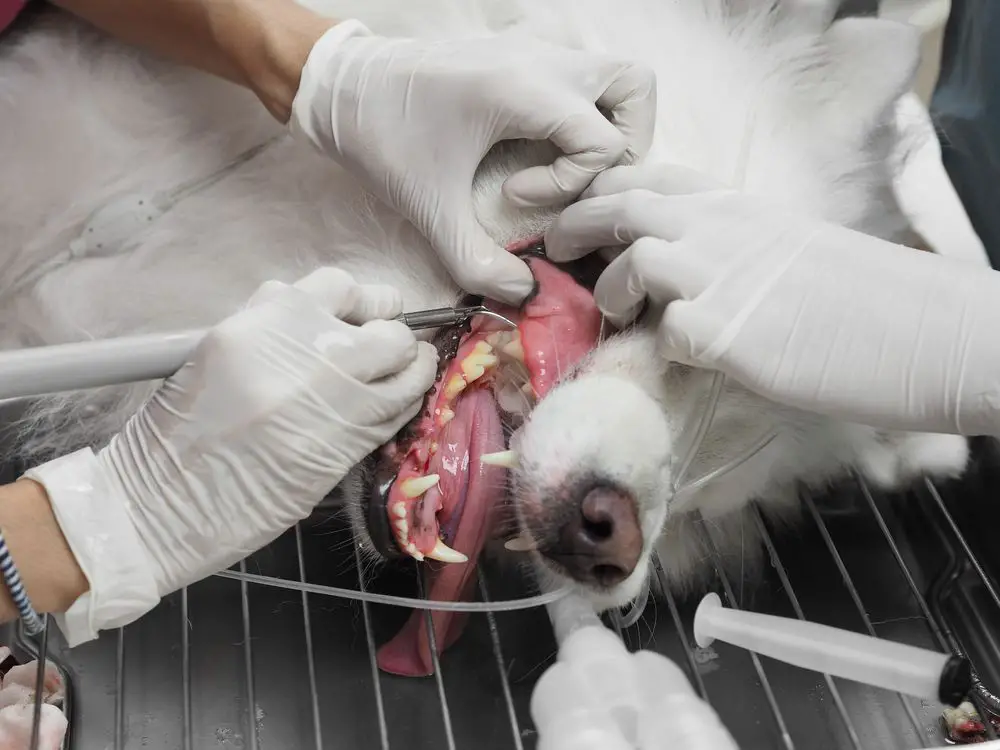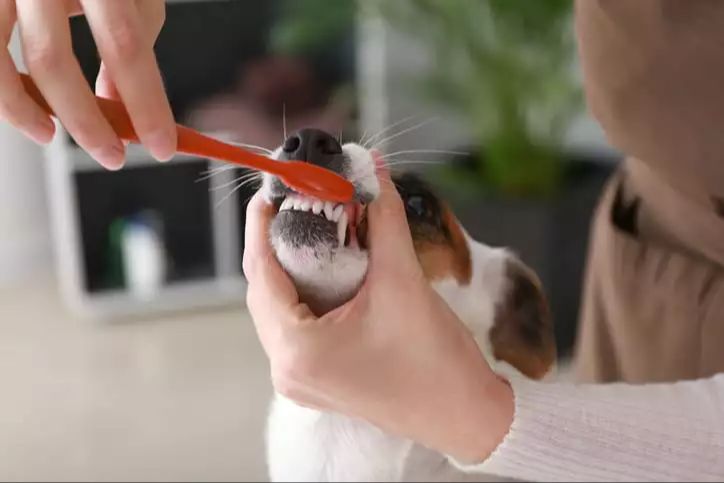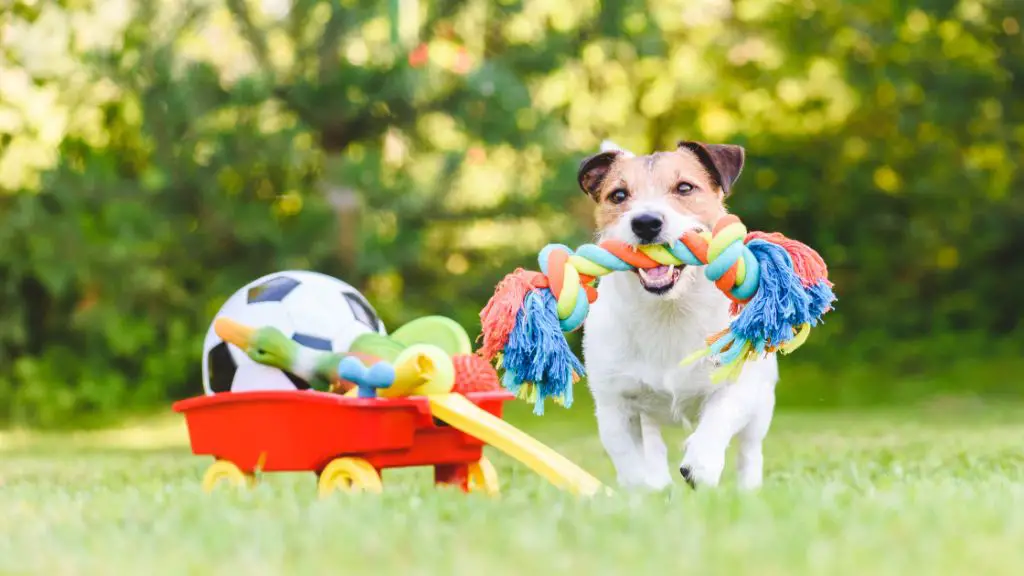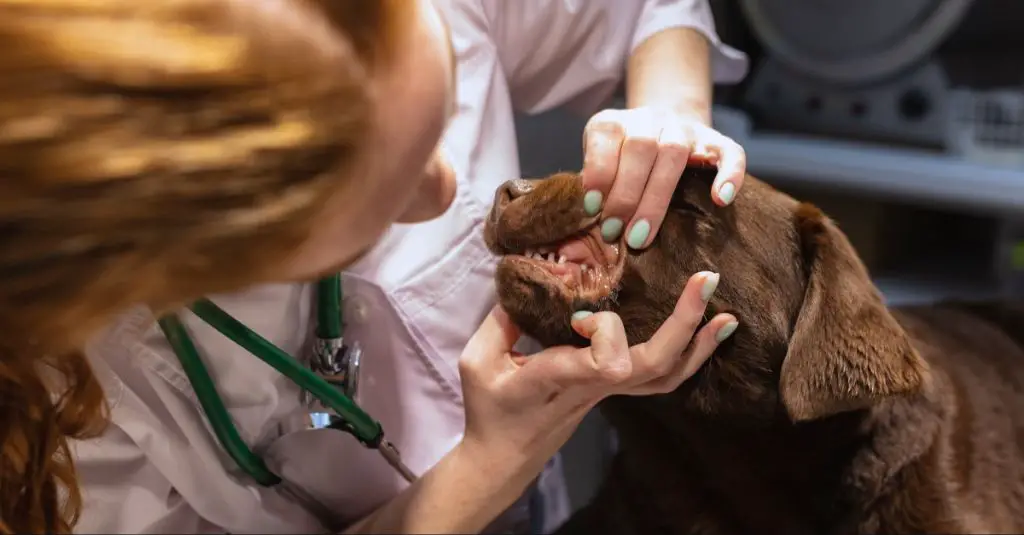The Importance of Dental Care for Dogs
Proper dental care is extremely important for dogs of all ages. Like humans, dogs can develop tooth decay, gum disease, and other oral health issues if their teeth are not cleaned regularly and monitored for problems. Poor dental health is not just a cosmetic issue – it can lead to pain, tooth loss, infection, and other serious medical conditions.
Dental disease is in fact the most common health problem diagnosed in adult dogs and cats. According to the American Veterinary Dental College, by age three 80% of dogs show signs of oral disease. Left untreated, bacteria from dental infections can spread through the bloodstream to damage internal organs. Dental disease may also make it difficult and painful for pets to eat.
For all these reasons, regular professional dental cleanings and ongoing dental care at home is a key part of maintaining your dog’s health and quality of life. With proper preventive care, dental disease is largely avoidable. This article will discuss the signs your dog may need a cleaning, what happens during a professional dental procedure, how often cleanings are recommended, and tips for at-home dental care.
Signs Your Dog May Need a Dental Cleaning

There are several signs that indicate your dog’s teeth may require professional cleaning from your veterinarian. The most common signs include:
- Bad breath – If your dog’s breath smells unpleasant even shortly after brushing their teeth, this can indicate a buildup of tartar and plaque.
- Discolored teeth – Over time, tartar buildup can discolor your dog’s teeth to a yellowish-brown color.
- Swollen or bleeding gums – Inflamed gums that appear red, swollen or bleed easily during brushing may indicate periodontal disease.
- Loose or missing teeth – Advanced dental disease can cause teeth to become loose or fall out.
- Difficulty eating – Your dog may show signs of discomfort or difficulty chewing and eating hard food.
- Decreased appetite – Bad breath or tooth pain can cause some dogs to eat less.
- Pawing at the mouth – Your dog may rub their face along the ground or excessively paw at their mouth.
If you notice any of these signs in your dog, it’s a good idea to schedule a veterinary dental exam. From there, your vet can determine if a professional dental cleaning and treatment is recommended.
Professional Dental Cleanings
A professional dental cleaning performed by a veterinarian is the most effective way to remove plaque buildup and tartar from your dog’s teeth. The cleaning process typically involves:
- General anesthesia – Your dog will be put under general anesthesia so the cleaning can be performed safely and thoroughly without causing pain or discomfort.
- Scaling – A scaler tool is used to scrape off tartar above and below the gumline. Both manual and ultrasonic scalers may be used.
- Polishing – The teeth are polished using a polishing paste and specialized tool to smooth the surface of the teeth.
- Fluoride treatment – A fluoride gel or foam may be applied to help strengthen tooth enamel.
- Oral exam – The veterinarian will examine the full mouth, look for signs of oral disease, and may take dental x-rays.
- Extractions – If severely damaged or infected teeth are found, they may need to be extracted.
Professional cleanings allow veterinarians to thoroughly examine, clean, and treat all areas of your dog’s mouth under safe and controlled conditions. They can remove tartar buildup that regular brushing may miss and provide deep cleaning below the gumline. The result is dramatically cleaner teeth and better oral health.
Veterinary Recommendations
Veterinarians generally recommend regular professional dental cleanings for dogs to maintain good oral health. However, there is some variation in how often vets recommend cleanings based on the individual dog’s needs.

Many vets recommend annual dental cleanings for adult dogs to prevent plaque and tartar buildup. For puppies and senior dogs, vets may recommend cleanings every 6-12 months since these ages are more prone to dental disease.
Some key factors vets consider when advising on dental cleaning frequency include:
- Breed disposition to dental disease
- Overall health and age of the dog
- Severity of existing dental disease
- Quality of at-home dental care
A vet will assess these factors during an oral exam and make an individualized recommendation for how often your dog needs professional cleanings. This may range from every 6 months to 1-2 years between cleanings.
So while general guidelines exist, it’s important to consult your veterinarian and follow their recommended schedule for your dog’s professional dental cleanings. They will tailor the frequency to your dog’s unique oral health needs and risks.
Factors That Determine Cleaning Frequency
There are several factors that influence how often your dog needs professional dental cleanings from your veterinarian:
Your Dog’s Age
Puppies generally don’t need professional cleanings until they are around 1 year old, as long as you are providing proper at-home dental care. Adult dogs typically need cleanings every 1-2 years depending on other factors. Senior dogs, especially those over age 10, may need more frequent dental cleanings such as every 6-12 months.

Your Dog’s Diet
Dogs fed soft, canned food are more likely to develop tartar buildup and may need more frequent dental cleanings. Dogs fed crunchy kibble or raw food diets tend to have less plaque buildup. Discuss your dog’s diet with your vet.
Your Dog’s Dental Health History
If your dog has had dental disease, tooth extractions or other issues in the past, your vet may recommend cleanings more often to prevent further dental problems. Dogs prone to rapid tartar buildup may need yearly cleanings.
Other factors like breed, genetics, and overall health can also impact your dog’s dental cleaning needs. Your veterinarian is best qualified to evaluate your individual dog’s situation and make professional recommendations on cleaning frequency.
For Puppies
A puppy’s baby teeth start coming in around 3-4 weeks of age. By around 8 weeks, they will have most of their baby teeth. Proper dental care should begin right away during this early puppyhood stage. The baby teeth play an important role in jaw development and help set the stage for proper alignment of permanent teeth. Starting dental care such as brushing early allows puppies to get used to the process so it becomes part of their routine.
Puppies should have their first veterinary dental examination around 6-12 months old or whenever the permanent teeth are growing in. Vets will check for any retained baby teeth that need to be extracted as well as examine the alignment and health of the permanent teeth. Early cleanings may be recommended based on your puppy’s unique needs. Some puppies are more prone to buildup and will need cleanings earlier or more frequently. Discuss a dental plan with your vet.
Establishing great at-home dental habits and professional cleanings early in a puppy’s life can prevent more serious dental disease as they grow up. It’s much easier to maintain good oral health than treat advanced dental disease down the road.
For Adult Dogs
On average, most adult dogs should have their teeth professionally cleaned once a year. However, some may need more frequent cleanings depending on their individual oral health.
An annual dental cleaning helps remove the tartar and plaque that builds up on a dog’s teeth over time. This buildup harbors bacteria that can lead to infection and tooth decay if not properly removed. Professional veterinary cleanings go beyond what you can do at home to fully clean, polish, and inspect all surfaces of the teeth.
Certain breeds prone to more dental problems, such as small dogs or brachycephalic breeds, may need cleanings twice a year. Adult dogs at higher risk for periodontal disease may also benefit from biannual cleanings. Your veterinarian will examine your dog and make an assessment based on the amount of tartar buildup, gum inflammation, and overall dental health.
While once a year is the general recommendation, be alert for any signs your dog may need an earlier cleaning, like bad breath, discolored teeth, or reluctance to eat. Regular veterinary checkups will also help determine if more frequent dental care is advisable.
For Senior Dogs
Senior dogs require more frequent dental cleanings than younger adult dogs. By around age 7, dogs are considered senior and their teeth often show more accumulation of tartar and plaque. The tissues in a senior dog’s mouth are not as strong as they once were and are more prone to periodontal disease. Older dogs may also have other health issues that make anesthesia riskier. These factors mean an older dog’s teeth may need professional cleaning at least once or twice per year.

Special considerations for older dogs:
- Your veterinarian will likely recommend pre-anesthetic bloodwork to ensure your senior dog is healthy enough for anesthesia.
- Some vets may recommend skipping anesthesia and using a non-anesthetic dental cleaning instead. While less risky, these cleanings are less thorough and may miss serious dental disease.
- Your vet can prescribe antibiotics and pain medication to reduce chances of infection and help your dog’s recovery after a cleaning.
- Extracting teeth rather than deep cleaning may be recommended if periodontal disease is advanced.
- More frequent at-home dental care can maintain dental health between professional cleanings.
- Your vet may recommend prescription dental food to reduce tartar buildup.
With extra precautions, dental cleanings under anesthesia are safe for most senior dogs and help prevent pain and serious dental infections. Work closely with your vet to determine the best dental care plan for your older dog.
At-Home Dental Care
You can help maintain your dog’s dental health between professional cleanings through at-home care. Here are some tips:
-
Brush your dog’s teeth daily if possible. Use a soft bristle toothbrush and dog-safe toothpaste. Brushing gently removes plaque before it hardens into tartar.
-
Give your dog dental treats and chews. Look for products with the VOHC (Veterinary Oral Health Council) seal, which means they are proven to reduce plaque and tartar. Good options include Greenies, CET chews, and Purina DentaLife treats.
-
Use oral rinses and sprays. These provide antibacterial ingredients that reduce plaque. Apply them after brushing or as a supplement between brushings.
-
Choose toys and chews that encourage chewing. Rubber toys help massage gums and remove plaque. Appropriately sized edible chews also scrub teeth.
-
Feed kibble instead of soft foods. The abrasive texture scrubs teeth, while crunchy biscuits and dental kibble are formulated to fight plaque and tartar.
While home care can’t replace professional veterinary dental cleanings, it helps maintain better dental health between cleanings.
Signs It’s Time for a Cleaning
If you notice any of the following signs, it may be time to schedule a professional dental cleaning for your dog:
-
Bad breath that does not resolve with brushing
-
Red, inflamed, or bleeding gums
-
Accumulation of tartar and plaque on teeth
-
Loose or missing teeth
-
Discoloration or brown buildup on teeth
-
Difficulty eating or reluctance to chew
-
Dropping food, chewing only on one side, or excessive drooling
-
Facial swelling or tenderness around mouth
-
Pawing at mouth or head shaking
If you notice any concerning dental symptoms, schedule an appointment with your veterinarian right away. Leaving dental issues unchecked can lead to tooth loss, infections, damage to internal organs, and other serious health problems.